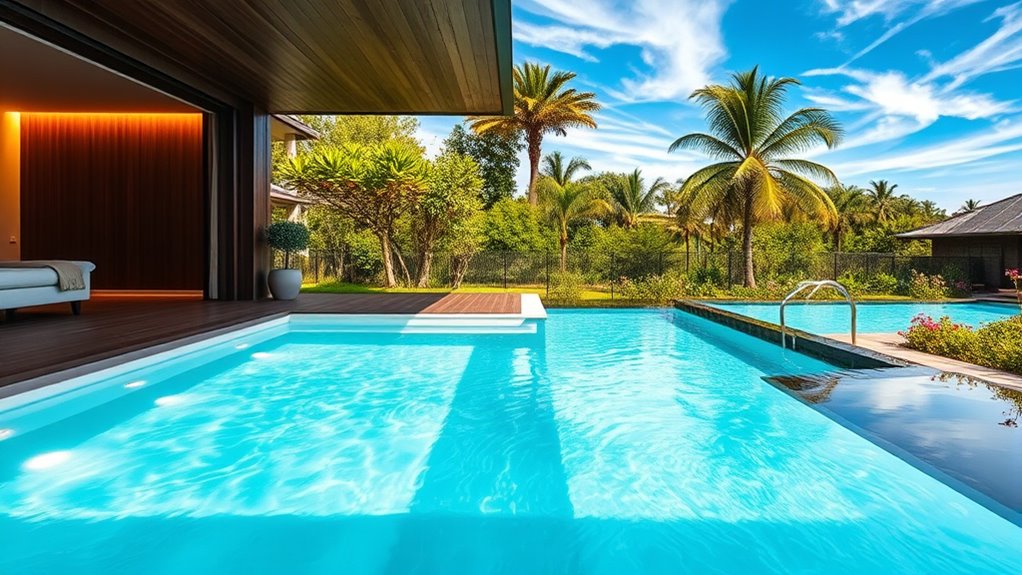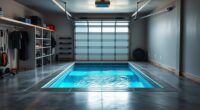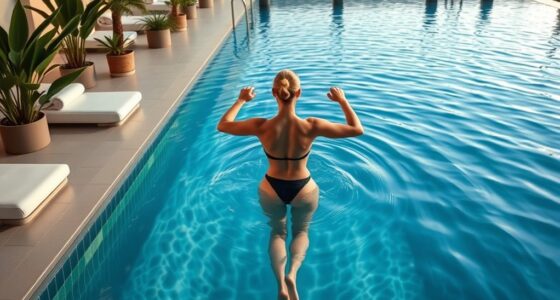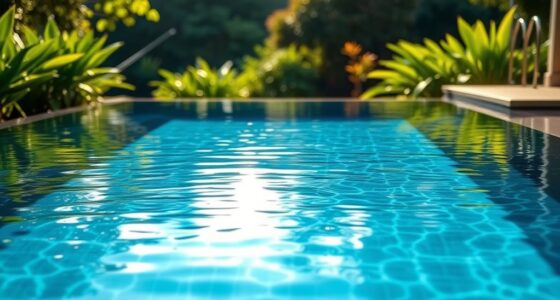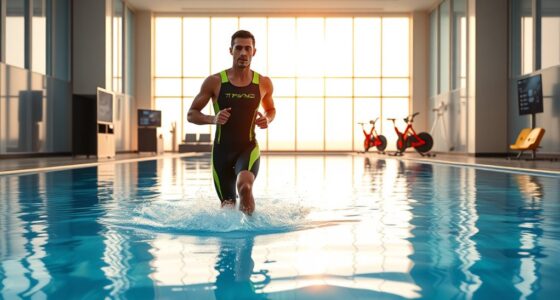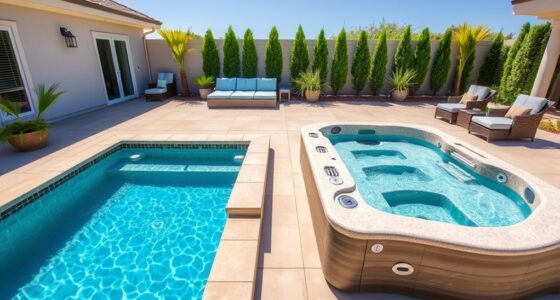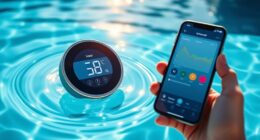Choosing between an indoor and outdoor endless pool depends on your lifestyle, climate, and style preferences. Indoor pools offer privacy, consistent comfort, and design flexibility while protecting from weather and debris. Outdoor pools create a natural ambiance, are usually easier to install, but need more maintenance and weather protection. Consider your space, safety, and how often you’ll swim year-round. Keep exploring to find out which option suits your needs best and how to make the most of your choice.
Key Takeaways
- Indoor pools offer year-round use and consistent climate control, while outdoor pools are weather-dependent and seasonal.
- Indoor endless pools provide greater design flexibility and seamless integration with home décor.
- Outdoor pools are more exposed to environmental elements, requiring more maintenance and durable, corrosion-resistant materials.
- Indoor pools prioritize privacy and safety with controlled environments, whereas outdoor pools need fencing and surveillance.
- Initial costs are higher for indoor pools, but they typically incur lower ongoing maintenance compared to outdoor pools.
Space Requirements and Placement Options

When choosing between an indoor or outdoor Endless Pool, understanding space requirements and placement options is essential. Indoor pools need a dedicated room with enough clearance for installation and maintenance, typically requiring a spacious area to accommodate the pool’s size and access points. You’ll also need to consider ceiling height and ventilation to prevent humidity buildup. Outdoor pools, on the other hand, demand an open, level space that can handle weather exposure and drainage. You might need extra landscaping or paving to create a stable base. Think about accessibility and how the pool integrates with your yard or home layout. Both options require planning for electrical connections and safety measures, but overall, your available space and how you want to use it play a vital role in your decision. Incorporating diverse designs can help your pool blend seamlessly with your environment and aesthetic preferences.
Climate Considerations and Weather Impact
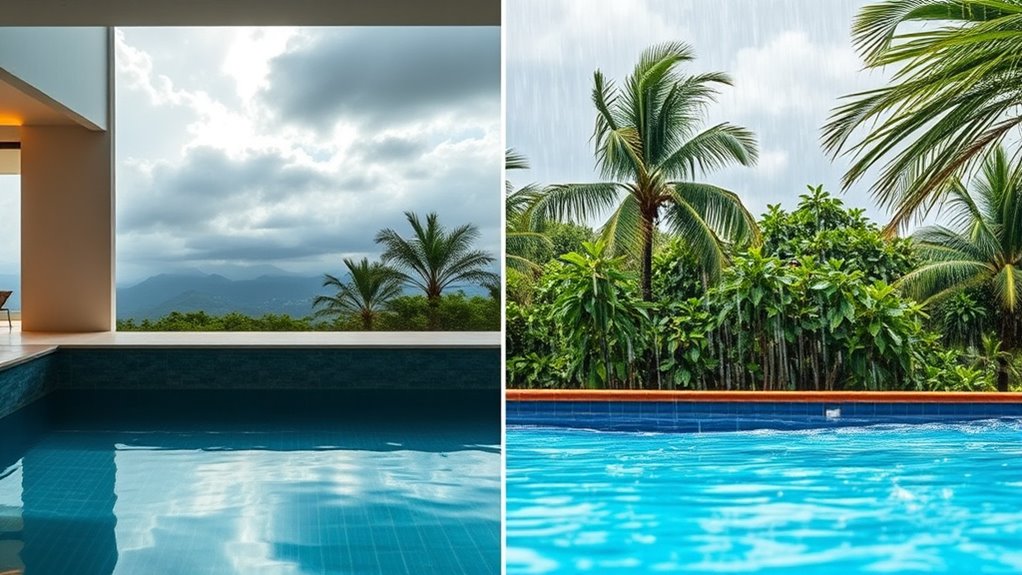
Climate and weather play a significant role in determining whether an indoor or outdoor Endless Pool is the better choice. If you live in an area with harsh winters, heavy rain, or extreme temperatures, an indoor pool offers consistent comfort and protection from the elements. You won’t have to worry about weather-related maintenance or closing your pool during storms. Conversely, if you enjoy warm, mild climates with plenty of sunshine, an outdoor pool can be more inviting and enjoyable year-round. Keep in mind that outdoor pools may require additional maintenance due to exposure to debris, UV rays, and temperature fluctuations. Your local climate will influence not just comfort but also the pool’s longevity and upkeep, so consider these factors carefully. Additionally, understanding how climate considerations impact pool maintenance can help you make a more informed decision.
Privacy and Noise Levels
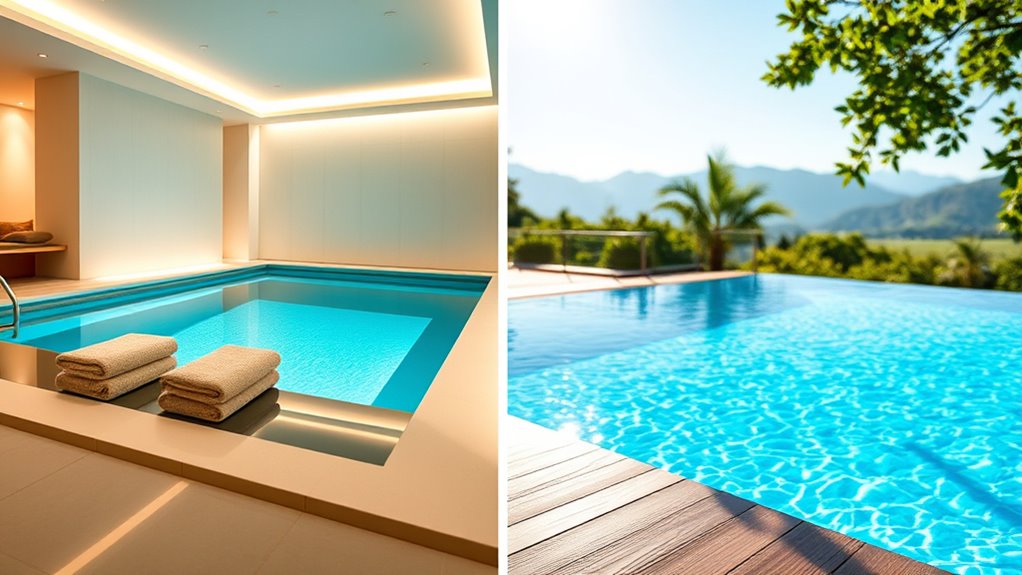
Indoor Endless Pools provide a private and quiet environment, shielding you from external noise and distractions. When you choose an indoor pool, you can enjoy your sessions without worrying about neighbors, traffic, or outdoor noise interruptions. This privacy allows you to relax fully and focus on your swimming, making it ideal if you value solitude or want a peaceful retreat. Additionally, indoor pools tend to be much quieter because they’re enclosed, minimizing sound from outside sources. This reduction in noise can make your workouts more comfortable and enjoyable. If privacy and tranquility are priorities for you, an indoor pool offers a controlled space where you can swim whenever you want without external disturbances. Soundproofing techniques further enhance the quiet environment, creating an optimal setting for relaxation.
Maintenance and Cleaning Demands
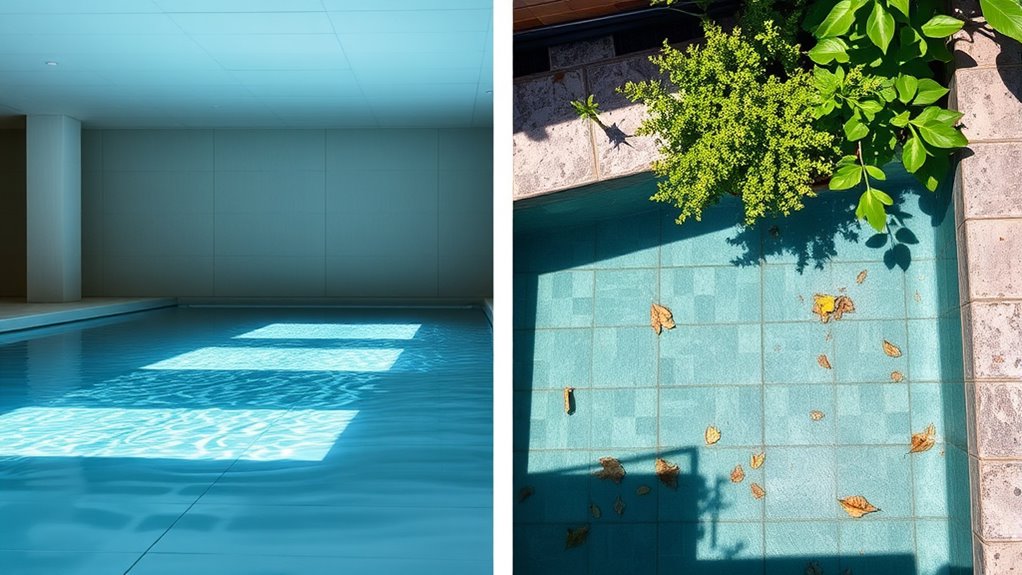
Maintaining and cleaning your pool can vary greatly depending on whether it’s indoors or outdoors. Indoor pools usually require less effort because they’re protected from debris and weather, making upkeep more straightforward. Outdoor pools, on the other hand, face dirt, leaves, and weather elements that can make cleaning more challenging and frequent.
Indoor Maintenance Ease
Because they are sheltered from outdoor elements, indoor pools generally require less frequent cleaning and fewer repairs. Maintenance tasks like balancing chemicals and cleaning filters are simpler and less frequent. Indoor environments help prevent algae buildup and reduce wear and tear on equipment. Additionally, forsale 100 indicates a stable market for pool equipment and accessories, making upkeep more affordable.
This means you spend less time on maintenance, and your pool stays cleaner longer, making indoor pools a more convenient choice for daily use.
Outdoor Cleaning Challenges
Outdoor pools face more frequent and demanding cleaning routines due to exposure to natural elements. Debris like leaves, dirt, and bugs can quickly accumulate, requiring regular skimming and vacuuming. You’ll need to monitor for algae growth caused by sunlight and warm temperatures, which can escalate maintenance efforts. Sun exposure also accelerates chemical evaporation, meaning you’ll often need to check and balance water chemistry. Rain can introduce contaminants, diluting disinfectants and requiring you to adjust your treatment levels. Wind can stir up dust and debris, increasing the frequency of cleaning. Overall, maintaining an outdoor pool demands consistent attention and more hands-on effort to keep the water clear, safe, and inviting. Proper routine is essential to prevent issues and prolong your pool’s lifespan. Regular testing and proper chemical balance are crucial to maintain water quality and prevent costly repairs.
Temperature Control and Seasonal Use
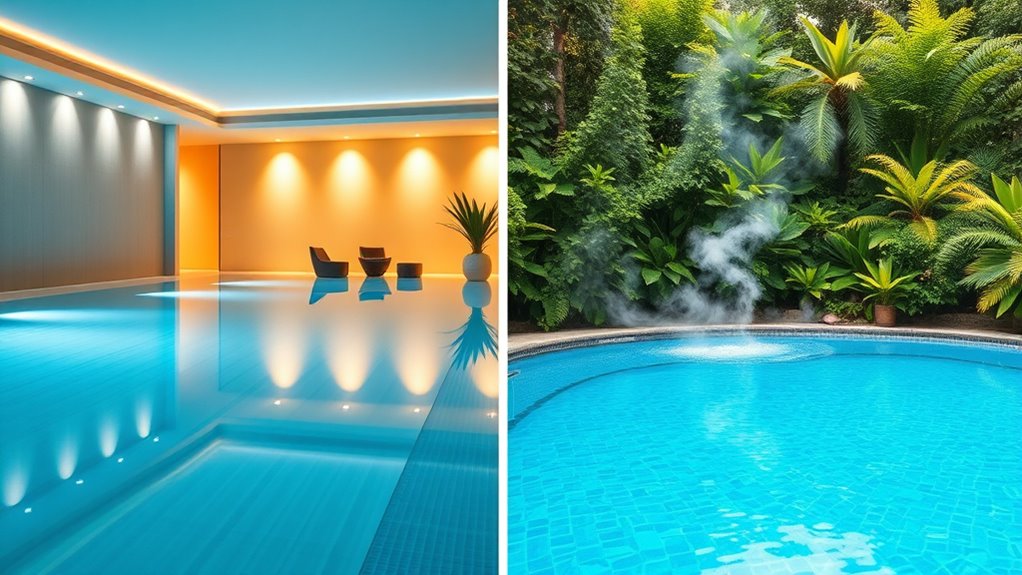
Indoor pools offer precise temperature control year-round, allowing you to enjoy swimming regardless of the season. You can set the water to your preferred temperature and maintain it consistently, ensuring a comfortable experience every time. Unlike outdoor pools, indoor pools aren’t affected by weather changes, so you won’t have to worry about cold drafts, wind, or temperature fluctuations disrupting your swim. This control also means you can extend your swimming season, even during colder months, without needing additional heating or cover. Whether you prefer a warm, relaxing soak or a brisk workout, indoor pools give you the flexibility to customize the environment to suit your needs. This consistent temperature management makes indoor pools ideal for daily use and year-round enjoyment. Water efficiency features in indoor pools can also help conserve energy and resources while maintaining optimal conditions.
Cost Differences and Installation Expenses
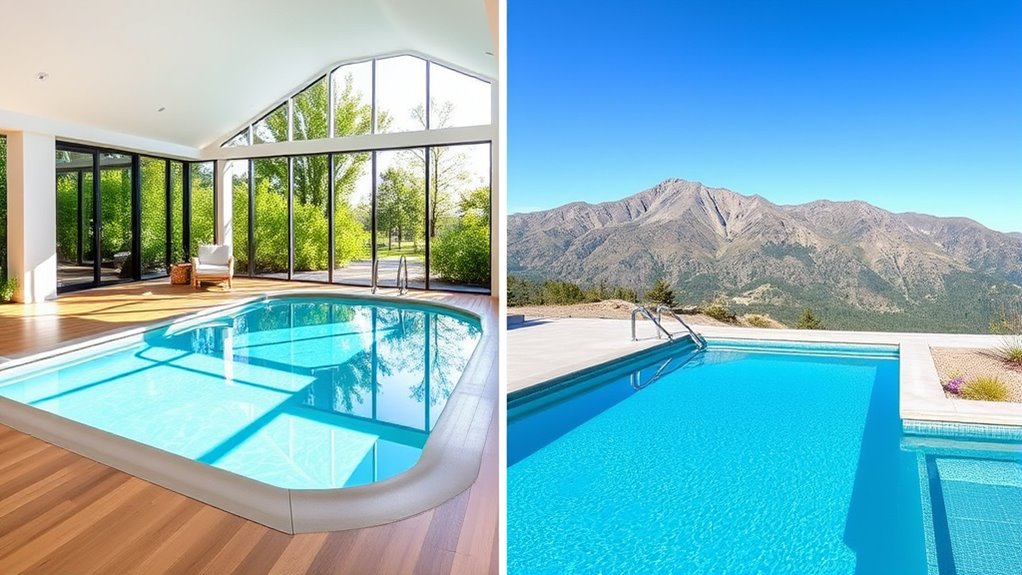
Installing an indoor pool typically involves higher upfront costs due to construction, climate control systems, and specialized ventilation. These expenses include building a dedicated space, installing HVAC systems, and ensuring proper air quality. Outdoor pools generally have lower initial costs, mainly covering the pool itself and basic landscaping. To visualize the difference:
| Indoor Pool Costs | Outdoor Pool Costs |
|---|---|
| Building structure | Simple excavation |
| HVAC and ventilation systems | Minimal weatherproofing |
| Finishing and insulation | Landscaping |
While indoor pools demand a larger investment at the start, they provide year-round use and protection from weather. Outdoor pools are more budget-friendly initially but may incur ongoing costs for maintenance and weather-related repairs, especially when considering factors like climate control and seasonal changes.
Accessibility and Convenience
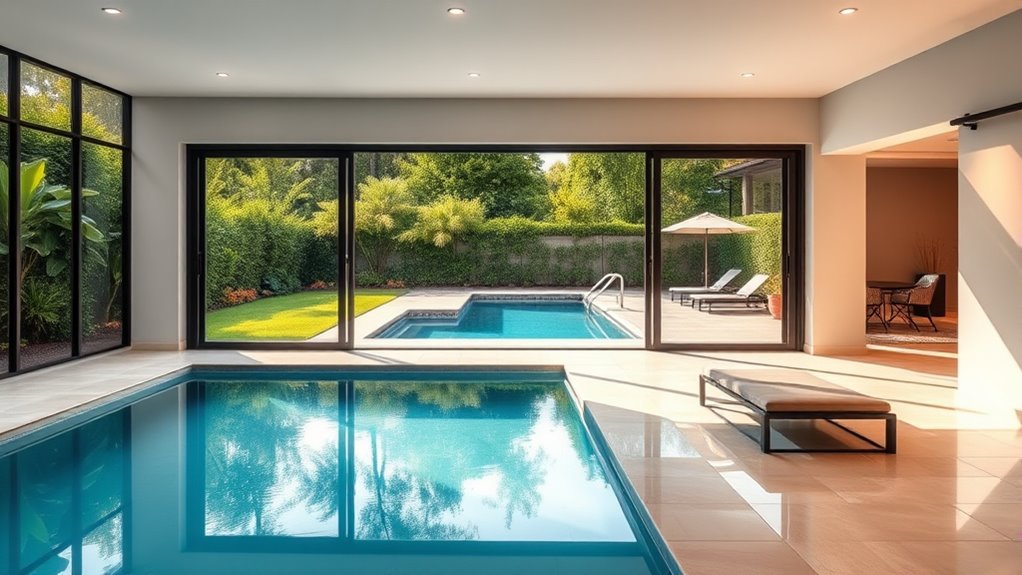
Accessibility and convenience often influence how frequently and easily you can enjoy your pool. With an indoor Endless Pool, you have the advantage of year-round access regardless of weather. You can swim whenever it suits your schedule without outdoor restrictions. Plus, being indoors means you don’t need to worry about outdoor elements like rain, wind, or pests. On the other hand, outdoor pools are more accessible if your home has a backyard or patio space close by, allowing for quick dips without planning ahead. However, outdoor setups might require more maintenance due to debris and weather exposure. Overall, indoor pools offer more consistent convenience, while outdoor pools provide spontaneous access, especially if you value enjoying nature during your swim. Volkswagen Tuning enthusiasts often appreciate the benefits of customization and easy maintenance, which can be more straightforward with indoor pools.
Safety Features and Security Measures

When considering safety, indoor pools let you control precautions like proper barriers and childproof covers to prevent accidents. Outdoor pools require security measures such as fencing and surveillance to keep your space safe. Both settings demand tailored safety features to protect you and your loved ones effectively.
Indoor Safety Precautions
Ensuring safety when using an indoor endless pool is essential to prevent accidents and promote peace of mind. You should install a reliable, child-proof lock on the pool door to prevent unauthorized access. Keep the area well-lit to avoid slips and falls, especially around entry points. Use non-slip mats or textured flooring around the pool to reduce the risk of slipping. Always maintain clear visibility of the pool area from other parts of your home, possibly with security cameras or windows. Install an easily accessible emergency shut-off switch and ensure everyone knows how to use it. Keep safety equipment like life rings or reaching tools nearby. Regularly check the pool’s safety features and maintain proper ventilation to prevent humidity buildup and mold. Additionally, integrating AI-based safety monitoring can help detect hazards early and enhance overall security measures.
Outdoor Security Measures
Outdoor pools require robust security measures to safeguard against unauthorized access and ensure safety. You should install fences with self-latching gates to prevent children or pets from wandering in unsupervised. Surveillance cameras can monitor activity around your pool, deterring intruders. Adequate lighting enhances visibility at night, reducing accident risks. Additionally, alarm systems on gates or doors alert you to unauthorized entry. Consider adding a pool cover with a locking mechanism for extra protection when the pool isn’t in use. Here’s a quick overview:
| Security Measure | Purpose |
|---|---|
| Fences & Gates | Prevent unauthorized access |
| Surveillance Cameras | Monitor activity |
| Lighting | Increase visibility and safety |
| Pool Cover with Locking | Secure the pool when unused |
Implementing these features helps keep your outdoor pool safe and secure.
Aesthetic Appeal and Design Flexibility
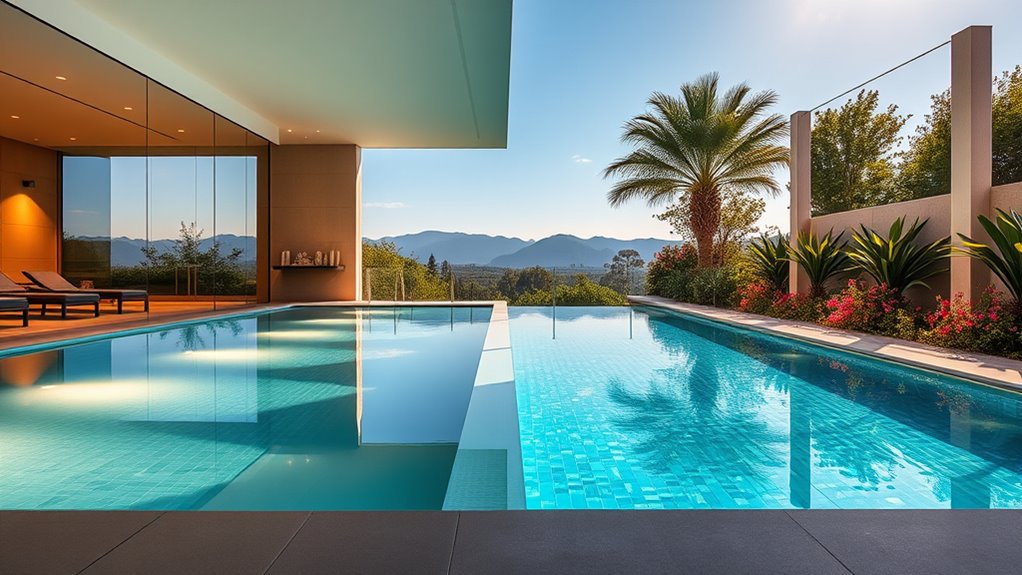
Indoor Endless Pools offer a sleek, customizable look that seamlessly integrates with your home’s design, giving you more control over aesthetics. You can choose from various shapes, sizes, and finishes to match your décor and personal style. With an indoor pool, you have the flexibility to incorporate features like built-in lighting, modern tiles, or even a custom surround to create a luxurious, cohesive space. This environment allows you to prioritize visual harmony, making your pool a stunning focal point or subtle complement to your interior. Unlike outdoor pools, which are often limited by natural surroundings, indoor pools let you design an aesthetic that reflects your tastes, ensuring your pool enhances your home’s overall appeal and creates a personalized retreat.
Resale Value and Long-Term Investment
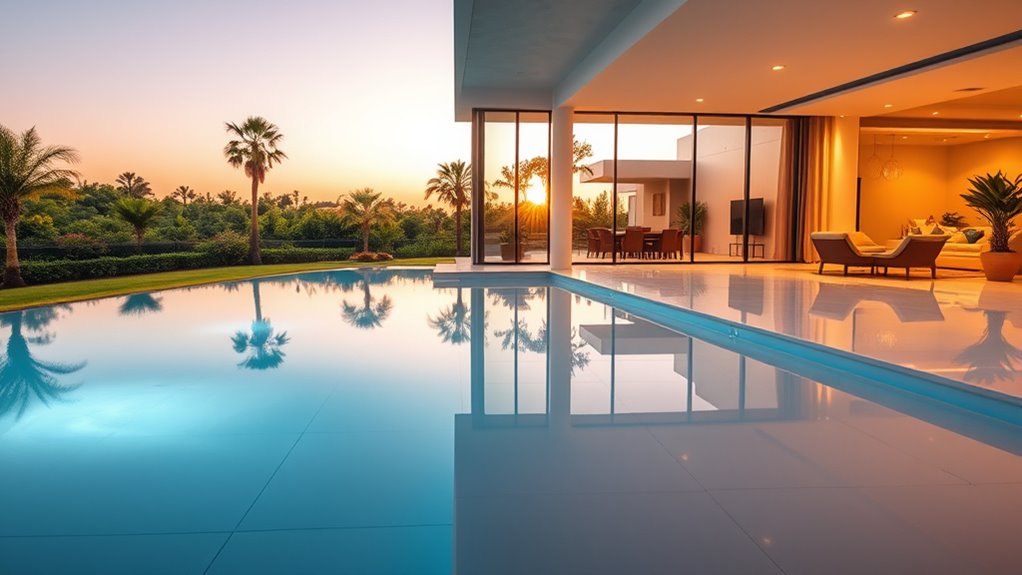
Outdoor pools often boost resale value because they withstand weather and last longer, making them a smart long-term investment. Indoor pools may appeal more initially but could require costly maintenance that affects their value over time. Consider how durability and appeal influence your pool’s future resale potential before making a choice. Additionally, soil quality can impact the longevity and stability of outdoor pools, affecting their overall value.
Outdoor Pool Durability
When evaluating the long-term investment potential of a pool, durability plays a crucial role in its resale value. Outdoor pools face more exposure to weather, UV rays, and the elements, which can accelerate wear and tear if not properly maintained. High-quality materials, corrosion-resistant components, and sturdy construction are essential for ensuring longevity. Regular maintenance, such as sealing surfaces and inspecting equipment, helps prevent damage from sun, rain, and temperature fluctuations. An outdoor pool built with durable materials retains its appearance and functionality longer, making it more appealing to future buyers. Investing in quality now means fewer costly repairs later, preserving your pool’s value over time. Ultimately, durability directly impacts your pool’s resale value and your long-term satisfaction with your investment.
Indoor Pool Appeal
A well-designed indoor pool can considerably boost your home’s resale value and appeal to future buyers. It signals luxury, convenience, and year-round enjoyment, making your property stand out. Buyers often see an indoor pool as a versatile feature that requires less maintenance from weather exposure, which can translate into lower upkeep costs over time. Additionally, an indoor pool provides privacy and comfort, allowing for use regardless of season or weather conditions. This convenience appeals to families, fitness enthusiasts, and those seeking a lifestyle upgrade. When you invest in a stylish, well-maintained indoor pool, you’re not just adding a luxury feature—you’re enhancing your home’s long-term value and attractiveness in a competitive market.
Frequently Asked Questions
Which Pool Type Offers Better Long-Term Durability?
Outdoor pools generally offer better long-term durability because they’re designed to withstand weather elements like sun, rain, and snow. You might need to perform regular maintenance, such as cleaning and sealing, but their sturdy construction helps them resist corrosion and damage over time. Indoor pools may last just as long if well-maintained, but exposure to humidity and chemicals can accelerate wear and tear more quickly indoors.
Are Outdoor Pools More Energy-Efficient Than Indoor Pools?
Outdoor pools tend to be more energy-efficient because they lose less heat indoors, reducing the need for energy-intensive heating systems. You’ll likely save on energy costs since outdoor pools benefit from natural sunlight and airflow, which help maintain water temperature. However, they may require extra energy for covers or heating during colder months. Overall, outdoor pools can be more cost-effective energy-wise, especially if you live in a milder climate.
How Do Indoor Pools Impact Home Value Differently?
You might find that indoor pools boost your home’s value more because they offer year-round usability and privacy, making your property more attractive to buyers. A well-maintained indoor pool signals luxury and convenience, which can elevate your home’s appeal. Plus, you avoid weather-related issues that outdoor pools face, ensuring consistent enjoyment. Ultimately, an indoor pool can be a strong selling point, increasing your home’s desirability and market value.
Can Outdoor Pools Be Customized More Than Indoor Pools?
Outdoor pools often offer more customization options since you’re working with open space and natural surroundings. You can choose unique shapes, add features like waterfalls or fire pits, and incorporate landscaping to create a personalized oasis. Indoor pools typically have limited customization due to space constraints and structural considerations. So, if you want a highly tailored design, outdoor pools give you more flexibility to match your style and preferences.
What Are the Best Options for Pool Covers and Protection?
Did you know that a good pool cover can extend your pool’s lifespan by up to 50%? For protection, you should consider a durable, weather-resistant cover like a solar or safety cover. Solar covers help retain heat and reduce evaporation, while safety covers keep debris out and prevent accidents. Choose a cover that fits your pool size and climate for maximum protection and longevity, ensuring your pool stays clean and safe year-round.
Conclusion
Choosing between an indoor or outdoor endless pool depends on your lifestyle and preferences. If you value privacy and climate control, an indoor pool offers comfort year-round. But if you enjoy natural scenery and want to save space inside, outdoor pools might be better. Ultimately, it’s about balancing convenience, maintenance, and your personal oasis. Trust that investing in the right pool will boost your relaxation and even your home’s value, making every swim worth it.
